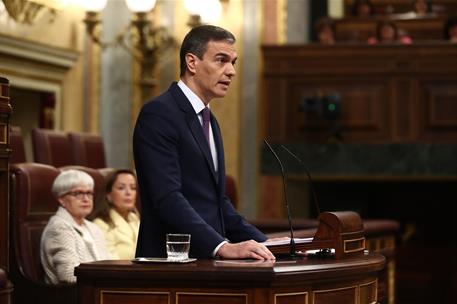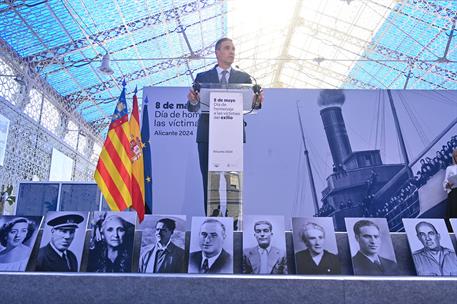Council of Ministers
Government of Spain approves recognition of the State of Palestine
Council of Ministers - 2024.5.28
Moncloa Palace, Madrid
Pilar Alegría, José Manuel Albares, and Ángel Víctor Torres, at the press conference after the Council of Ministers (Pool Moncloa/Borja Puig de la Bellacasa)
The Council of Ministers has approved the recognition of the State of Palestine, a decision that the Minister for Foreign Affairs, European Union and Cooperation, José Manuel Albares, has described as a "historic milestone". He said that it is a day "when our country says that indifference is unthinkable in the face of suffering, and that peace, solidarity, commitment and trust in humanity are possible".
The minister argued that this is an act of justice towards the Palestinian people, an essential measure to guarantee Israel the security it rightfully demands and the only viable path to peace in the region: "The Palestinian people have a right to a future of hope, just as the people of Israel have a right to a future of peace and security. And after so many decades of pain and confrontation, we know that there cannot be one without the other".
The coexistence of two states, the only solution to the conflict
José Manuel Albares pressed the point that the entire international community, including Israelis and Palestinians themselves, knows that the solution to the Middle East conflict lies in the existence of two states, Israel and Palestine, living side by side in peace and security. Today's recognition of the State of Palestine by Spain, Norway and Ireland brings the number of countries that share this position to 146. "And very soon others will join us, like Slovenia, which will do so on Thursday. This is a very large majority of the international community," he said.
The foreign minister also pointed out that the recognition reflects the "feelings of Spanish society", which advocates peace, believes in international law and maintains close ties with all Mediterranean peoples. The decision, he added, also reflects the will of the Spanish Parliament, which on 18 November 2014 approved a non-legislative proposal in favour of the recognition of Palestine as an independent state, and is consistent with the position the Executive has maintained on the issue. In this regard, Albares recalled that on 10 May Spain, along with 142 other countries, sponsored and voted in favour of Palestine becoming a full member of the UN.
The Minister for Foreign Affairs, European Union and Cooperation, José Manuel Albares, during the press conference after the Council of Ministers | Foto:Pool Moncloa /Borja Puig de la Bellacasa
On the timeliness of the measure, Albares said that "we cannot wait any longer" to adopt it because since the terrorist attacks against Israel on 7 October there have been more victims than in all previous outbreaks of violence. He also pointed out that this is the oldest unresolved problem the UN has ever faced. "Hundreds of thousands of people, children and entire families are right now as I speak deprived of food, water, medicine, shelter and, above all, they are in fear for their lives," said Albares, adding that more than 100 hostages are still in the hands of Hamas and that "violence has taken the lives of 1,200 Israelis, including two compatriots, and more than 35,000 Palestinians".
Recognition is the beginning of the road to peace, said Albares, who underlined the Government of Spain's commitment to continue on this path with initiatives such as the holding of an international peace conference "as soon as possible after the violence ends". More than 80 countries have already adhered to the Spanish proposal. In the short term, the President of the Government of Spain, Pedro Sánchez, will tomorrow receive foreign ministers from several Middle Eastern countries at Moncloa Palace.
Immediate effects of recognition
With regard to the practical consequences of the decision, the minister specified that "it involves recognising Palestine as a subject of international law to all intents and purposes" and "from this very morning, from the moment the decision was made". Spain already had established diplomatic relations with Palestine, which has a mission in Madrid, and has stated that diplomatic relations with the country will continue to be conducted through diplomats at the Spanish Consulate in Jerusalem.
Asked about the reaction of Israel's foreign minister, Albares said he is in agreement with his colleagues in Ireland and Norway, "who are also receiving a backlash ", to "give a coordinated, calm and firm response". With regard to the "threat" to prevent Spanish diplomats from contacting the Palestinian people and authorities, the minister pointed out that this is being studied by the ministry's International Legal Department and the entire team in charge of relations with the Middle East. "There are certain privileges and immunities that Spain scrupulously respects with all the countries of the world, with their embassies and consulates, and we demand the same respect on the basis of international law," he said.
Albares said that the essential thing is to achieve a ceasefire, the entry of humanitarian aid and the release of the hostages, and to support the International Court of Justice in its demand to Israel for precautionary measures in Gaza, especially the cessation of the military operation in Rafah. In this regard, he explained that yesterday the 27 EU foreign ministers unanimously decided to summon their Israeli counterpart to give appropriate explanations within the framework of the Association Agreement between the EU and Israel, bearing in mind that should Israel not implement the decision of the International Court of Justice, the measures proposed by the EU High Representative may be adopted.
Appeal of unconstitutionality against the repeal of the Law of Democratic Memory of Aragon.
The Council of Ministers has agreed to ask the President of the Government, Pedro Sánchez, to lodge an appeal of unconstitutionality against the entirety of Law 1/2024, which repeals Law 14/2018 on the democratic memory of Aragon. Once it has been admitted for processing by the Constitutional Court, the effectiveness of the contested law as a whole will be suspended.
The Minister for Territorial Policy and Democratic Memory, Ángel Víctor Torres, during the press conference after the Council of Ministers | Foto:Pool Moncloa /Borja Puig de la Bellacasa
The Minister for Territorial Policy and Democratic Memory, Ángel Víctor Torres, recalled that this law was published in the Official Gazette of Aragón on 29 February. The Government analysed a report on the development of the Law of Democratic Memory and its impact on the autonomous communities on 2 April, which reflected that the regulation approved by the Government of Aragon to repeal its 2018 autonomous law on democratic memory violates the principles of public international law on the matter, the resolutions of the UN and all international conventions signed by Spain. Moreover, it encroaches on the competences of the Spanish State.
The Executive also addressed on 7 May a report on compliance with international human rights standards on historical memory, after receiving on 3 May a communication from the UN rapporteurs on the legislative initiatives in this area promoted by the autonomous communities of Aragón, Valencia and Castilla y León. The rapporteurs' text urges the Spanish State to adopt all necessary measures to ensure strict respect for international human rights standards on the preservation of historical memory.
The Executive then activated the dialogue mechanism established by the Organic Law of the Constitutional Court to discuss with the Government of Aragon the formula needed for its text to return to the constitutional sphere.
Ángel Víctor Torres pointed out that the Executive of Aragón communicated in writing that it rejected the Government's invitation to dialogue and agreement: "The Government of Spain wanted to talk, negotiate and sit down with the government of Aragon, which said no".
The minister explained that after requesting the opinion of the Council of State, today the Council of Ministers approved, with its endorsement, the lodging of the appeal against the Aragonese law as a whole, on the grounds that the region had violated its powers and the principle of collaboration with the Spanish State, as well as articles 10 and 15 of the Constitution.
Torres reiterated that the new law in Aragon removes the signs of concentration camps and places of memory and eliminates the map of mass graves and the recognition and reparation of victims from the education system. It also hinders the activities of memorial associations and transparency through websites.
The Government considers, therefore, that the non-compliance with the state law on democratic memory results in a breach of the dignity of the victims and their moral integrity guaranteed by the Constitution. "To defend the duty of memory, reparation for the victims, non-repetition, truth; to prevent anyone from rewriting history in an attempt to whitewash Franco's dictatorship we have recourse to the Constitution, and we will do whatever is necessary to defend human rights and international law", he said.
Motor Insurance Bill and subsidy for trade unions
The Minister for Education, Vocational Training and Sports and Government Spokesperson, Pilar Alegría, during her speech at the press conference after the Council of Ministers | Foto:Pool Moncloa /Borja Puig de la Bellacasa
The Minister for Education, Vocational Training and Sports and Government Spokesperson, Pilar Alegría, has informed that the Council of Ministers has approved the draft Motor Insurance Law, which aims to improve coverage, compensation and safety for accident victims.
The draft legislation, which will now be sent to the Lower House of Parliament for parliamentary approval, extends the range of vehicles that must have compulsory civil liability insurance to include agricultural and industrial vehicles, as well as personal mobility vehicles. It includes for the first time the obligation of liability insurance for owners of electric scooters and establishes the creation of a register of this type of light vehicles.
It also introduces improvements in compensation for victims through more streamlined procedures for assessment and payment, as well as an increase in the amount of compensation. In this regard, the amounts of the coverage will be updated in accordance with the CPI, and some compensation assumptions are increased or extended to improve the coverage of those affected, such as the case of persons dedicated to household chores in the family unit.
Last, Alegría informed of the Council of Ministers' authorisation of a €17 million subsidy for trade union organisations, a sum that will be distributed - according to criteria of representativeness - among 74 organisations.
Non official translation






